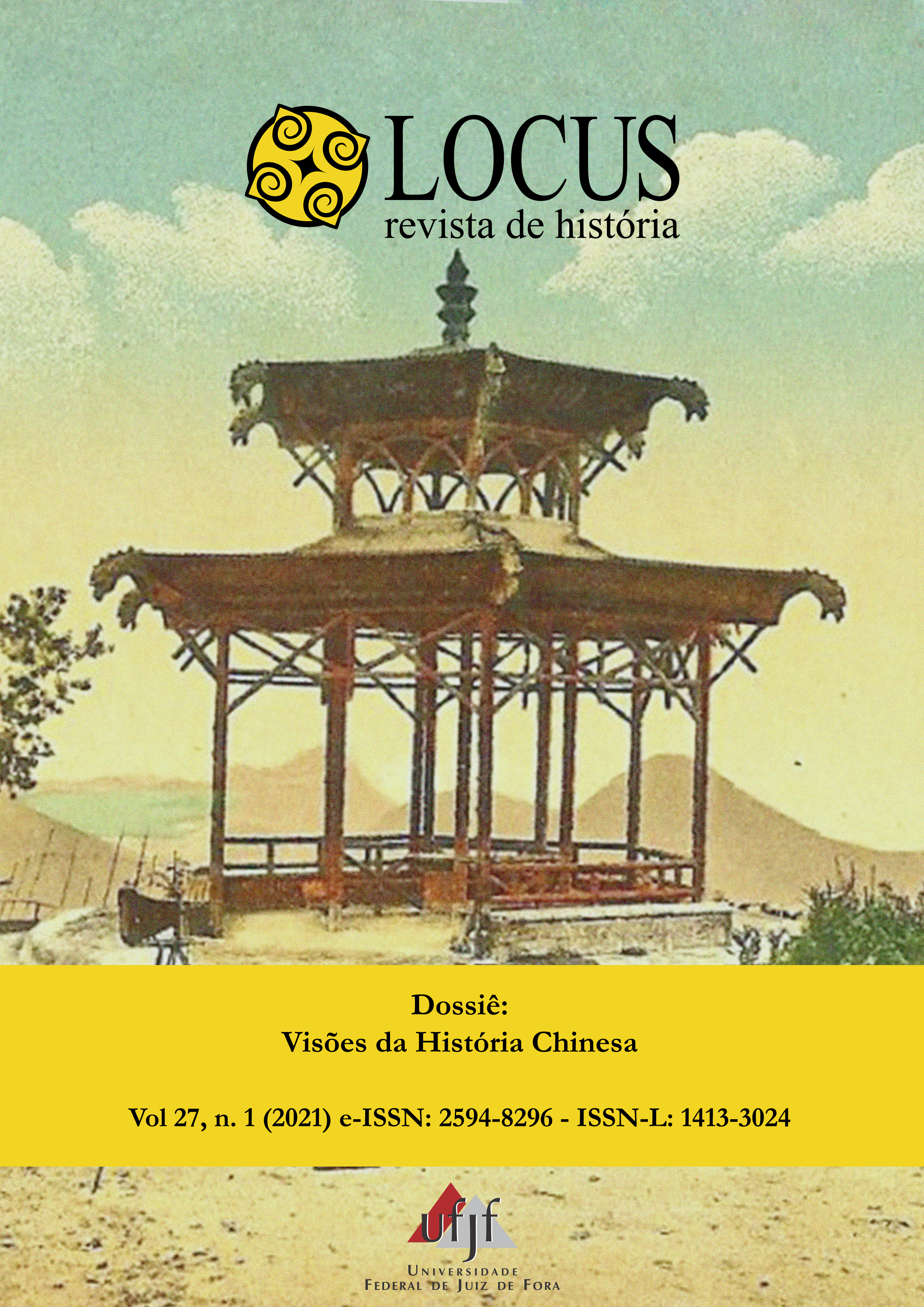Published 2021-05-13
Keywords
- Immigration,
- Edwidge Danticat,
- Jean Kowok.
How to Cite
Copyright (c) 2021 Antonio de Pádua Bosi, Aparecida Darc Souza

This work is licensed under a Creative Commons Attribution 4.0 International License.
Abstract
This paper proposes a historical approach to immigration regarding literature, particularly Brother, I am Dying, by Edwidge Danticat, and Girl, Translated, by Jean Kowok. The main argument explores immigrants' experiences regarding (i) the reasons for leaving (ii) the expectations and frustrations experienced, (iii) the institutional and informal mechanisms of reception and (iv) the immigration seen as feelings, particularly the formation of the family and other sociabilities. We understand that this theme has been related to the idea that literature is inspired by historical experiences, as is the case here. This has made possible a reflection on History because literature is also a document and an intervention interested in reality. Theory and method have considered these characteristics in order to interrogate, analyze and explore Brother, I'm dying and Girl, Translated from the perspectives identified in the authors and from the points that made up the research script. Finally, I hope that the results will encourage the insertion of history in the expressive recent migrations whose importance have been reported by migrants in tragic and dramatic narratives, rather than in epic and successful formats.
Downloads
References
- Agirdag, O. “The long-term effects of bilingualism on children of immigration: Studant biliguism and future earnings”. International Journal of Bilingual Education and Biliguism, 17, n.3 (2013): 1-16. https://doi.org/10.1080/13670050.2013.816264
- Aristóteles. Aristóteles. São Paulo: Nova Cultural, 1991. Vol.II.
- Austen, Veronica. “Empathetic Engagement in Danticat’s Brother, I’m Dying”. Ariel: A Review of International English Literature, Volume 44, Numbers 2-2, (2013): 29-57. The Johns Hopkins University Press and the University of Calgary, 2014. https://doi.org/10.1353/ari.2013.0012
- Bascome, Erik. 2017. “Coalition presents a ‘Bill of Rights’ for Staten Island”. https://www.silive.com/news/2017/01/local_coalition_delivers_state.html.
- Bennett, Ian B. Danticat, Edwidge. “Brother, I’m Dyin”. Anthurium: A Caribbean Studies Journal. Volume 6, No.1, (2008): 1-4.http://scholarlyrepository.miami.edu/anthurium/vol6/iss1/10. https://doi.org/10.33596/anth.117
- Bloch, Marc. Apologia da História. Ou o Ofício de Historiador. Rio de Janeiro: Zahar, 2002.
- Cardo, Amanda. 2011. “Jean Kwok and the Girl in Translation (Part Two)”. https://www.sampsoniaway.org/literary-voices/2011/05/06/jean-kwok -and-the-girl-in-translation-part-two/.
- Chan, Shelly. Diaspora’s Homeland: Modern China in the Age of Global Migration. Durhan: Duke University Press, 2014.
- Collier, Paul. Exodus: How Migration Is Changing Our World. New York: Oxford University, 2013.
- Corbin, H.P. “Guyanese Migration and Remittances to Guyana: a case study of their potentials and challenges for Guyana’s economy”. Tese de Doutoramento, Belém, Universidade Federal do Pará. 2012.
- Danticat, Edwidge. Adeus, Haiti. Rio de Janeiro: Agir, 2010.
- Danticat, Edwidge. Brother, I am Dying. New York: Alfred A. Knopf, 2007.
- DuBord, Elise M. Language, Immigration and Labor. Negotiating work in the U.S.-Mexico Bordearlands. Londres: Palgrave Macmillan, 2014.
- Goytisolo, Juan. A Saga dos Marx. São Paulo: Cia das Letras, 1996.
- Jadotte, Evans. 2009. “International migration, remittances and Labour supply: the case of Republica Haiti”. https://ideas.repec.org/p/unu/wpaper/rp2009-28.html.
- James, C.L.R. Os jacobinos negros: Toussaini L’ouverture e a revolução de São Domingos. São Paulo: Boitempo, 2010.
- Kowok, Jean. Garota, Traduzida. Rio de Janeiro: Editora Objetiva, 2011.
- Kowok, Jean. Girl in Translation. New York: Penguin, 2010.
- Krogstad, J.M, e J. Radford. 2018. “Education levels of U.S. immigrants are on the rise”. https://www.pewresearch.org/.
- Licad, Abigail. 2010. “Interview with ‘Girl in Translation’ Author Jean Kwok”. https://hyphenmagazine.com/blog/2010/8/17/interview-girl-translation-author-jean-kwok.
- Lu, Yao, e Feng Hou. 2019. “Over-education among University-educated Immigrants in Canada and the United States”. https://www.statcan.gc.ca/eng/start
- Lukács, Georges. “Arte y verdad objetiva”. Em Problemas del Realismo, Georg Lukács, 11-54. México – Buenos Aires: Fondo de Cultura Económica, 1966.
- Menard-Warwick, J. Gendered identities and immigration neworks in American. Bristol: Multilingual Matters, 2009. https://doi.org/10.21832/9781847692153
- McAlister, E. “The Madonna of 115th Street Revisited: Vodou and Haitian Catholicism in the Age of Transnatiolism”. Em Gatherings in Diaspora. Religious Communities and the New Immigration, orgs. Warner, R.S., e WITTNER, J.G. Wittner, 123-160. Philadelphia: Temple University Press, 1998.
- Missing Mediterranean. 2016. “Missing Migrants in the Mediterranean: Addressing the Humanitarian Crisis. http://www.mediterraneanmissing.eu.
- O Sul. 2019. O Brasil admite erros durante a missão da ONU no Haiti. http://www.osul.com.br/o-brasil-admite-erros-durante-a-missao-da-onu-no-haiti/.
- Orozco, Manuel. (2006) Understanding the remittances economy in Haiti. Inter-American Dialogue. Paper commissioned by the World Bank. http://archive.thedialogue.org/PublicationFiles/Understanding%20the%20remittance%20economy%20in%20Haiti.pdf.
- Ostapiuk, Joseph. 2019. “Mexican Independence Day celebration held in Port Richmond”. https://www.silive.com/news/2019/09/mexican-independence-day-celebration-held-in-port-richmond.html.
- Priore, Michael J. Birds of Passage. Migrant labor and Industrial Societies. Londres: Cambridge University Press, 1979. https://doi.org/10.1017/CBO9780511572210
- Seguy, Franck. “A catástrofe de janeiro de 2010, a ‘Internacional Comunitária’ e a recolonização do Haiti”. Tese de Doutoramento, Campinas, Universidade Estadual de Campinas, 2014.
- Rey, T., e A. Stepick. “Refugee Catholicism in Little Haiti: Miami’s Notre Dame d’Haiti Catholic Church”. Em Churchs and Charity in the Immigrant City. Religion, Immigration, and Civic Engagement in Miami, orgs. Stepick, A, T. Rey, e S. MAHLER, 72-91. New Brunswick: Rutgers University Press, 2009. https://doi.org/10.36019/9780813547145
- Misra, Jivin. “An Interview. Edwidge Dunticat”. The Brooklyn Review. 2018. http://www.bkreview.org/category/fall-2018/.
- Thompson, E.P. “Socialist Humanism: An Epistle to the Philistines” Em The New Reasoner. London, 1957, nº1, 105-143. http://banmarchive.org.uk/collections/nr/index_frame.htm.
- United Nations. 2019. “The number of international migrants reaches 272 million, continuing an upward trend in all world regions, says UN”. https://www.un.org/development/desa/en/news/population/international-migrant-stock-2019.html.
- World Bank. 2018. “Personal remittances, received (% of GDP)”. https://data.worldbank.org/indicator/BX.TRF.PWKR.DT.GD.ZS

